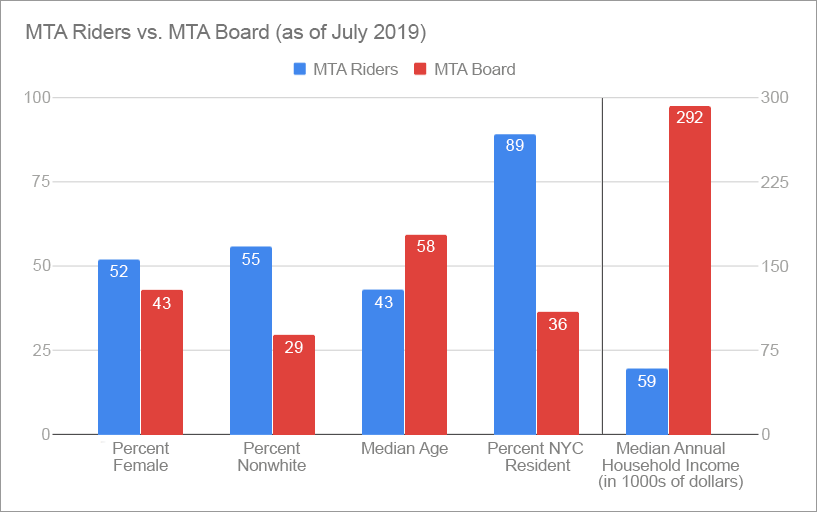Who is the MTA Board? 89% of MTA Riders Are NYC Residents Versus 36% of Voting Board Members
36% of Voting Board Members
Will NYC Riders Get Fair Share of MTA 5-Year Capital Plan?
Board Members Predominantly Suburban, White, Wealthy
Only 36% of the MTA Board lives in New York City compared with 89% of MTA riders, according to Reinvent Albany’s latest analysis, Who is the MTA Board? (July 2019). While the State Senate was in session, Governor Cuomo chose not to nominate one of Mayor de Blasio’s recommendations, leaving the city without one of its four permitted Board seats, likely until January 2020. Currently, New York City has less representation on the Board than a year ago, when 41% of Board members lived in the city. This representation is particularly important as the MTA Board is expected to approve the next 5-year capital plan this fall.

At least 55% of MTA riders are non-white compared to 29% of Board.
- If the MTA Board mirrored ridership, at least 9 of its 17 board members (when fully appointed) would be nonwhite; currently, that number is only four. There is not a single board member of Asian descent.
Median age of MTA riders is 43, median age of MTA Board is 58.
- The youngest MTA board member is 41, and as of July 2019 the board had 8 members under 60.
Median household income of MTA riders is $58,000, median household income for Board is $292,080.
- This makes board members’ median household income more than 5 times that of riders. Many board members possess hundreds of thousands of dollars in real estate holdings and investments, and their average incomes greatly exceed New Yorkers’.
52% of MTA riders are women versus 43% of Board members.
- As recently as March 2019, there were only three women on the Board. Since then, the number has doubled to six, or 43% of the Board (about 52% of MTA riders are female).
Several Board members were also noted to have incomplete filings and apparent conflicts of interest. Haeda Mihaltses, for example, does not list any income or business before the state on her disclosure form, yet in her confirmation hearings and in news reports before her appointment, it was noted that she represented Sterling Project Development, an owner of the Mets, on the Belmont Redevelopment Project, which now includes a proposed LIRR train station. She has stated that she will recuse herself on any votes before the MTA Board, but this conflict is not reflected on her form.
